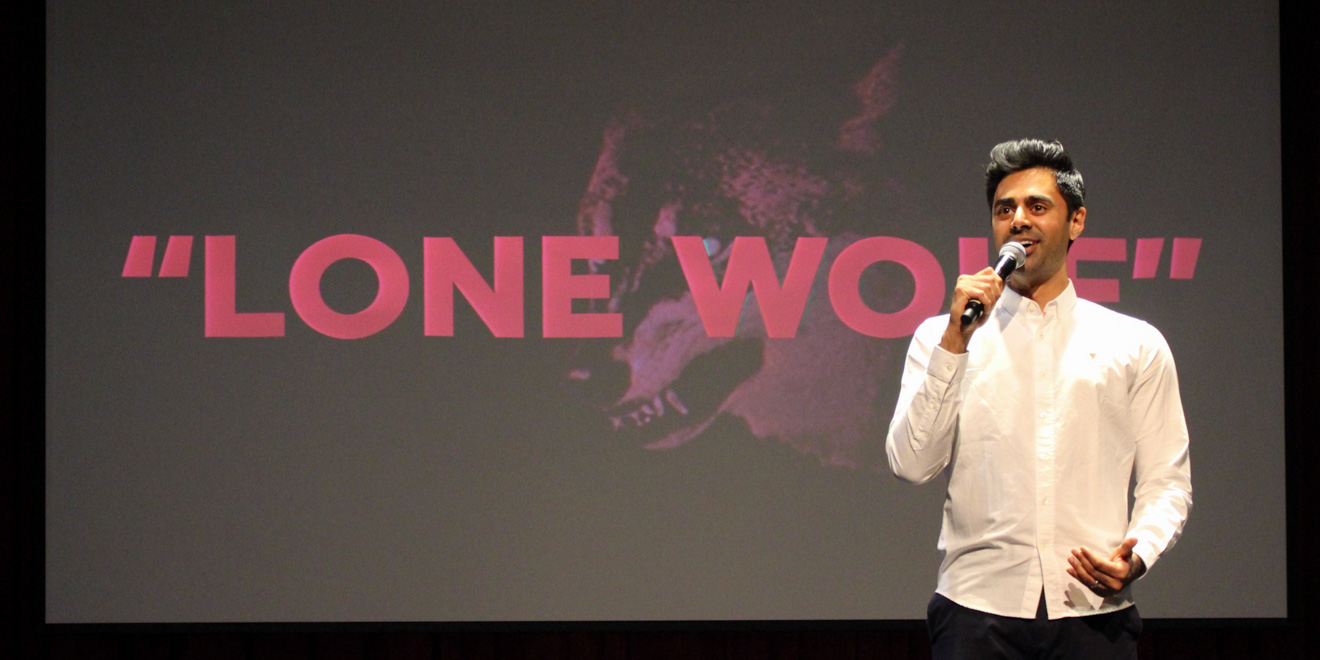On Friday night, comedian and senior correspondent on The Daily Show Hasan Minhaj explained — through the vantage point of his own identity as a Muslim Indian-American — why Americans need not worry about refugees committing acts of terrorism.
At the event, which was organized by the Stanford Speakers’ Bureau (SSB) and Stanford Sanskriti and hosted in Dinkelspiel Auditorium, Minhaj previewed comedic material he may use on his new Netflix talk show in the fall of 2018.
Minhaj, who hosted last year’s White House Correspondents’ Dinner, opened with a story about a visit to Alabama where a clerk became hesitant about selling him a gun, suggesting that he could be a member of the Islamic State of Iraq and Syria (ISIS).
“Alright, brown people — have you ever been offended but flattered at the same time?” Minhaj asked. “ISIS, a global terror organization, was like, ‘You know what we need? We need like an Indian boy band member. What is Hasan Minhaj up to?’”
Minhaj pulled up statistics confirming that many more people are killed annually by furniture than by acts of terrorism, but then — quipping that one furniture company’s products are so difficult to assemble — said, “Unless of course it’s IKEA furniture, in which case it counts as both.”
Minhaj attributed much of the fear of Islamic terrorism to the way the media presents the group. For instance, he criticized how news anchors highlight Islamic terrorists’ connections to ISIS, while referring to white people who commit acts of terrorism as singular actors.
“I just don’t like the double standard,” he said. “A brown man goes crazy, we get teed up. A white dude goes crazy, the news is just like, ‘Twelve individual wolves…’ You know, if only there was a pattern. You’re like, ‘Oh, you mean like a pack of wolves?’ ‘No, these are twelve individual wolves.”
In the second half of the event, Minhaj spoke in conversation with actor and Stanford lecturer Lisa Rowland about his personal journey as a comedian.
Minhaj’s talk was extremely popular with the student body. On Friday morning, SSB announced that the 710-seat theater was sold out. Prior to the event, the entry line extended from the Dinkelspiel door nearly to The Axe and Palm in Old Union.
Several students were looking forward to the evening because they felt Minhaj would share a less mainstream perspective that reflected their own particular identities.
“I’m pretty excited for him to share part of my narrative with the community [especially] as someone who is also first generation, American-born immigrant — like, I’m American-born Chinese, he’s American-born Indian,” said SSB co-president Alex Lee ’18 before the event.
Lee feels that comedy often fails to address some identity issues.
“[Some comedy is] kind of dumbed down — ‘Oh, the Chinese kid has smelly food at lunch.’ And yeah, that’s an experience I share,” Lee said. “But does that speak my truth? Does that speak my narrative? Not exactly. It’s one that’s safe for TV.”
He anticipated that Minhaj would “go a little deeper than surface-level comedy.”
Neel Guha ’18, co-chair of Stanford Sanskriti, pointed out that Minhaj’s comedy usually makes allusions specific to the South Asian experience.
“And so that’s nice, because whenever someone makes a reference you understand, you automatically feel like you’re part of a larger family,” Guha said.
Guha also commented on how prevalent the theme of family expectations is in Minhaj’s work. “He has this line of ‘Log kya kahenge,’ [what will people say,] which most South Asian kids understand,” Guha said.
Minhaj discussed how his cultural identity and family expectations shaped his comedy.
When asked about his biggest turning point, he said, “This is going to sound super nerdy, but, you know, I’m an Indian kid with Indian parents. I think when my parents sort of accepted my career.”
Drawing upon Indian stereotypes, he used his parents’ ambitions for him to make a joke about former neurosurgeon, former Presidential candidate and current cabinet member Ben Carson.
“I just got to give it to you, man,” he said, “Growing up as an Indian-American, my dad always wanted me to grow up to be a brain surgeon. But then I was like, ‘Dad, what if I grow up to be Ben Carson?’ And he was like, ‘Well son, maybe comedy isn’t so bad after all.’”
At the end of the Q&A, Rowland pointed out that, since Stanford is near Minhaj’s hometown, his parents were able to attend the event. They stood and waved while the audience cheered and applauded.
Audience member Jason Liu ’18 said, “He brings a new flavor to comedy. It’s very woke, but he keeps it really real.”
Another attendee, Samsara Durvasula ’22 said, “I didn’t have a ticket, so I stood in line for an hour and a half. I’m so happy I got to see it.”
“I think it was one of the more diverse rooms I’ve seen at Stanford,” Guha said.
Minhaj seemed equally enthused to be onstage. “It’s such an honor to perform at a school I could never get into,” he said.
Contact Mini Racker at mracker ‘at’ stanford.edu
